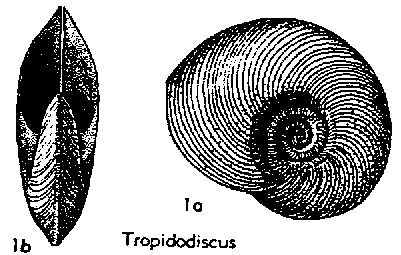
| Palaeos |  |
Bellerophontoidea |
| Mollusca | Tropidodiscidae |
| Page Back | Unit Up | Clade Up: Conchifera | Page Next |
| Unit Back | Clade Down: None | Mollusca References | Unit Next |
HELCIONELLOIDA (paraphyletic) |--Paragastropoda `--+-?Tropidodiscidae |-?Bellerophontoidea `--GASTROPODA (crown group) |==Eogastropoda `--Orthogastropoda |
Contents
Overview |
Taxa on This Page
o Unnamed Clade (= Tergomya in part) `-o "Gastropodiformes" `--+--Chippeaella patellitheca `--+-- Unnamed Node |-- Strepsodiscus major |-- Strepsodiscus paucivoluta |--o Tropidodiscidae | |-- Chalarostrepsis praecursor | `--+-- Eubucania mexicana | `-- Peelerophon oehlerti `--o Gastropoda |

|
|
Tropidodiscus curvilineatus (Conrad 1842). |
During the Furongian (Late Paiban Age) the first gastropods, torted Bellerophontiforms, appear. According to the torted bellerophonts are here shown to be diphyletic. For the sake of convenience the Order Bellerophontida (or Superfamily Bellerophontoidea, depending on your prefeernce; in any case cladistic terminology does not use Linnaean ranks) is defined as the later clade to emerge. The early, paraphyletic grouping belongs to a separate grade, which includes subfamily Tropodiscinae and a number of other species. Were one to use a Linnaean approach, and assuming the diphyly is valid, then these would represent a separate order, let us say the "Tropodiscida", which stand right at the beginning of gastropod evolution.
|
Gastropoda: (stem-group definition - Helix > Cyrtolites (= "Gastropodiformes") : Limpets, periwinkles, whelks, snails, slugs, torted bellerophonts, etc. Stratigraphic Range: Furongian (Paiban Age) to Recent Phylogeny: Unnamed Clade (= Tergomya in part) : (Cyrtonelliodea + Stem Group Gastropods : Chippewaella + Unnamed Node Characteristics: $ Torsion; streptoneury (as a result of torsion nervous system is twisted in a figure-8 shape - reversed in advanced forms); prosobranchy (as a result of torsion gills in front of the heart - reversed in advanced forms); primitively planispiral shell; docoglossa-type radula. Note: Using a functional definition, with Gastropoda defined solely by the presence of torsion, this is the clade that represents the class as defined by Cuvier. However some workers prefer to use crown group definitions; i.e. the Clade Gastropoda as the last common ancestor of all extant Gastropods. In that case this clade should be called "Gastropodamorpha" or "Gastropodiformes" to distinguish it from the "Gastropoda proper" Links: see Links section Chippewaella: Chippewaella patellitheca. Stratigraphic Range: Furongian. Phylogeny: "Gastropodiformes" : Chippewaella + Unnamed Node Notes: According to Wagner 1999 this is the most basal gastropod. Old link: Outgroups (website at http://pjw3.fmnh.org no longer current) Unnamed node: Helix > Chippewaella . Stratigraphic Range: Furongian. Phylogeny: "Gastropodiformes" : Chippewaella + Unnamed node : Strepsodiscus + Tropidodiscidae + Crown Group Gastropoda Notes: According to Wagner 1999 this is an unresolved polytomy. Old Link: Outgroups (website at http://pjw3.fmnh.org no longer current)
Strepsodiscus: Strepsodiscus major, Strepsodiscus paucivoluta. Stratigraphic Range: Early Furongian (Dresbachian [Runnegar_and Jell 1976 p.121] = Paiban Age) . Geographic Distribution: Laurentia [= N. Am - Knight, et al., 1960 p. I174] Phylogeny: Unnamed Node : Strepsodiscus + Tropidodiscidae + Crown Group Gastropoda Characteristics: $ anal emargination a deep angular sinus; $ coiling slightly asymmetrical, with closely coiled early whorls protruding toward left, last whorl disjunct, all whorls sharply crested; has posterior train; growth lines are only surface features known [Knight, et al., 1960 p. I174]. Taxon Rank: Family Strepsodiscidae (new, informal)
Notes: Knight, et al., 1960 include Strepsodiscus within the Cyrtolitidae, an assemblage that includes both torted (Gastropod) and untorted (Tergomyan) forms and should be restricted to non-gastropods. For taxonomic purposes one might perhaps suggest transferring the genus Strepsodiscus to its own (presumably) paraphyletic Family ("Strepsodiscidae") Old Link: Outgroups (website at http://pjw3.fmnh.org no longer current) Tropidodiscidae: primitive torted bellerophonts: Chalarostrepsis, Peelerophon, Eobucannia, Bucanopsis, Tropidodiscus. Stratigraphic Range: Late Furongian (Franconian-Trempealeauan (Chalarostrepsis) [Runnegar & Jell (1976)] = Early or Late Dolgellian) to Early Devonian (Tropidodiscus) [Knight, et al., 1960 p. I179] Geographic Distribution: Cosmopolitan [= N. Am, S. Am., Eu., Asia - Knight, et al., 1960 p. I179] Phylogeny: Unnamed Node : Strepsodiscus + Tropidodiscidae + Crown Group Gastropoda Characteristics: Coil narrow, with wide umbilici; $ slit deep (evolved independently of Bellerophontina; commonly with a definite posterior train [Knight, et al., 1960 p.179]. Taxon Rank: Family Tropidodiscidae Knight, 1956
Notes: According to Wagner 1999 the Tropidodiscid Bellerophonts are the sister group of all other gastropods. Old Link: Outgroups (website at http://pjw3.fmnh.org no longer current) |
| Page Back | Page Top | Unit Home | Page Next |
page uploaded 4 March 2003
checked ATW051004
original material by M. Alan Kazlev (Creative Commons)
this material may be freely used
all other material © original authors or sources